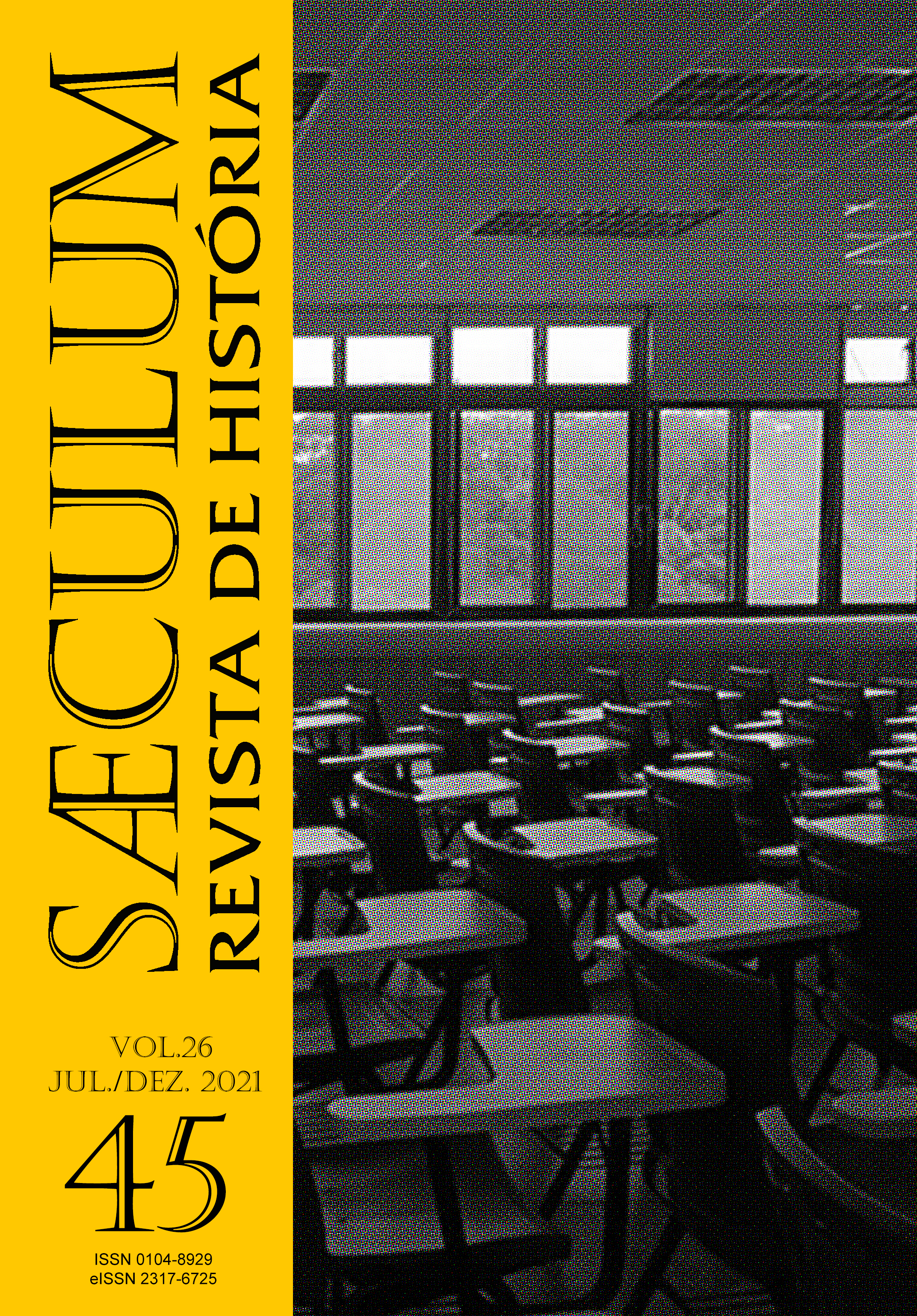Teachers in dark times: ethical objectivations in History Teaching
DOI:
https://doi.org/10.22478/ufpb.2317-6725.2021v26n45.60375Keywords:
Ethic, Teaching Experience, History teachingAbstract
We seek in the essay to debate about the directions of an ethics in the teaching of History. We aim to situate elements of everyday life and teaching practice as constitutive forms of paths towards ethics within the classroom. Therefore, we will present the progress of the debate mentioned, establishing a dialogue with reference authors. We will follow this path with two perspectives on the subject: ethics as a guiding element of our professional action, as well as ethics as an intrinsic component of school history knowledge, permeating the entire teaching-learning relationship of our discipline. We will also bring up dialogues with teaching in basic education, intending to launch intelligibility about experiential knowledge, promoting a dialogue between theory and empirical. In our analysis we found interesting results. It was from these problems and the multiple crises experienced in our country that the debate on ethics originates, in the disciplinary community of professors, teachers, researchers and researchers in the Teaching of History. Based on the contributions of colleagues, we observe that such teaching can be ethical insofar as we conceive the other placed inside the classroom and in the processes that we call teaching-learning as human beings. The other enters the scene at a certain time and in a certain space. Therefore, it is time to rethink the paradigms that guide our roles. These could enable the formation of a compassionate, empathetic, and less strange look in face of the characteristic differences of our human condition. We need an approach to History teaching that contemplates not only the cognitive dimension, but also the affective and ethical ones. We thus defend a teaching of history committed to ethics born of the richness that represents the human experience, this courageous collective adventure.
Downloads
References
Fontes
KAMEL, Ali. O que ensinam às nossas crianças. O Globo. São Paulo, 18/09/2007. Disponível em: http://www.alikamel.com.br/artigos/que-ensinam-nossas-criancas.php. Acesso em 10 de jun. 2021.
SCHMIDT, Mario Furley. Nova História Crítica. Ensino Médio: volume único. São Paulo: Nova Geração, 2005.
PENNA, Fernando. Compromissos éticos da docência em História: a trajetória de um debate. YouTube: ABEH Assoc. Bras. Pesq. em Ensino de História. Disponível em: https://www.youtube.com/watch?v=7vEBHERsGfI. Acesso em 30 jul. 2021.
PENNA, Fernando; ALBERTI, Verena; FERNANDES, Robson; SILVA, Mônica. Mesa redonda: por um código de ética de professores de História. YouTube: ABEH Assoc. Bras. Pesq. em Ensino de História. Disponível em https://www.youtube.com/watch?v=2NBhucvpHeE. Acesso em 30 jul. 2021.
SILVA, Mônica; COELHO, Mauro. A nossa resposta será um código de ética? YouTube: ABEH Assoc. Bras. Pesq. em Ensino de História. Disponível em https://www.youtube.com/watch?v=XDo1DP2aUfw. Acesso em 30 jul. 2021.
Referências
ARENDT, Hannah. A crise na educação. In: ARENDT, Hannah. Entre o passado e o futuro. São Paulo: Perspectiva, 1971, p. 221-247.
BAKHTIN, Mikhail. Estética da Criação Verbal. São Paulo: Martins Fontes, 2003.
DE BAETS, Antoon. A declaration of the responsibilities of present generations toward past generations. History and Theory, Theme Issue, n. 43, p.158-159, dec. 2004. DOI: https://doi.org/10.1111/j.1468-2303.2004.00302.x
DE BAETS, Antoon. Responsible History. Oxford, Ny: Berghahn Books, 2008. DOI: https://doi.org/10.3167/9781845455415
DE BAETS, Antoon. Uma teoria do abuso da História. Revista Brasileira de História. São Paulo, v. 33, n. 65, p. 17-60, 2013. DOI: https://doi.org/10.1590/S0102-01882013000100002
ECO, Umberto. Cinco Escritos Morais. Rio de Janeiro: Editora Record, 1998.
FREIRE, Paulo. Educação como Prática da Liberdade. 23. ed. São Paulo: Paz e Terra, 1999.
FREIRE, Paulo. Pedagogia da Autonomia: saberes necessários à prática educativa. São Paulo: Paz e Terra, 2005.
GEERTZ, Clifford. A Interpretação das Culturas. Rio de Janeiro: LTC, 2015.
GUIMARÃES, G. Teoria de gênero e ideologia de gênero: cenário de uma disputa nos 25 anos da IV Conferência Mundial das Mulheres. Tempo & Argumento, Florianópolis, v. 12, n. 29, e0107, jan./abr. 2020. DOI: https://doi.org/10.5965/2175180312292020e0107
GUIMARÃES, G. (et al). Considerações acerca da segunda versão da Base Nacional Comum Curricular – História. ANPUH, Associação Nacional de História, jun. de 2016. Disponível em: https://anpuh.org.br/index.php/2015-01-20-00-01-55/noticias2/diversas/item/3574-nota-sobre-a-segunda-versao-da-bncc. Acesso em 03 nov. 2021.
HOOKS, Bell. Ensinando a Transgredir: Educação como Prática da Liberdade. São Paulo: Martins Fontes, 2019.
LEIRNER, Piero C. O Brasil no espectro de uma guerra híbrida: militares, operações psicológicas e política em uma perspectiva etnográfica. São Paulo: Alameda Casa Editorial, 2020.
LUKÁCS, György et al. Ontologia do ser social. São Paulo: Boitempo, 2012.
LUKÁCS, György; ESTÉTICA, I. La peculiaridad de lo estético. Barcelona, Espanha: Grijalbo, 1966.
NICOLAZZI, F. Brasil Paralelo: restaurando a pátria, resgatando a história. A independência entre memórias públicas e usos do passado. Seminário 3x22: Independência, memória e historiografia, 24-28 de maio de 2021. Disponível em https://www.academia.edu/49455769/NICOLAZZI_Fernando_Brasil_Paralelo_restaurando_a_pa_tria_resgatando_a_histo_ria_A_Independ%C3%AAncia_entre_mem%C3%B3rias_p%C3%BAblicas_e_usos_do_passado. Acesso em 03 nov. 2021.
NIETZSCHE, Friedrich. Da Utilidade e do Inconveniente da História para a Vida. São Paulo: Lafonte, 2018.
OLIVEIRA, Sandra R. F. de (org.). Escolas em quarentena: o vírus que nos levou para casa. Londrina, PR: Editora Madrepérola, 2020.
PENNA, Fernando; SALLES, Diogo da Costa. A dupla certidão de nascimento do Escola Sem Partido: analisando as referências intelectuais de uma retórica reacionária. In: MUNIZ, Altemar de Costa; LEAL, Tito Barros (orgs.). Arquivos, documentos e ensino de história: desafios contemporâneos. Fortaleza: EdUECE, 2017, p. 13-37.
PIERUCCI, Antônio Flávio. As bases da nova direita. Novos Estudos Cebrap, v. 19, p. 26-45, 1987.
Downloads
Published
How to Cite
Issue
Section
License
Copyright (c) 2021 André Victor Cavalcanti Seal da Cunha, Felipe Dias de Oliveira Silva, Diogo Henrique Vianna

This work is licensed under a Creative Commons Attribution-NonCommercial 4.0 International License.
A revista Sæculum permite aos autores a manutenção dos direitos autorais pelo seu trabalho, no entanto eles devem repassar direitos de primeira publicação ao periódico.











